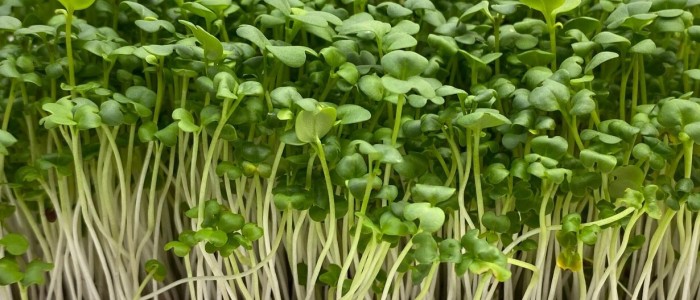-
 Turf Grass Seed Bluegrass, Bentgrass, Ryegrass, Fescues...
Turf Grass Seed Bluegrass, Bentgrass, Ryegrass, Fescues...
-
 Forage Seed Bromes, Clovers, Fescue, Wheatgrass, Legumes
Forage Seed Bromes, Clovers, Fescue, Wheatgrass, Legumes
-
 Grains Wheat Grain, Rye Grain
Grains Wheat Grain, Rye Grain
-
 Cover Crop Seed Buckwheat, Clover, Peas, Ryegrain
Cover Crop Seed Buckwheat, Clover, Peas, Ryegrain
-
 Wildflower Seed Mixtures, Singles, Annual, Perennial
Wildflower Seed Mixtures, Singles, Annual, Perennial
-
 Sprouting Seeds Fully certified Non-GMO Organic seeds for sprouts or microgreens
Sprouting Seeds Fully certified Non-GMO Organic seeds for sprouts or microgreens
Brown Mustard Non-GMO Sprouting Seeds
Brown Mustard seeds produce a robust spicy sprout that will add a zesty kick to salads, sandwiches, soups or other dishes where mustard spice is desired. The leaves can be harvested for fresh or cooked greens.
Seeding Rate:
Indoor: 3-5 seeds/ per inch
Outdoor: 250 seeds/ per 4 feet
How to Grow: Pre-sprout in a terra cotta sprouting saucer for best results. Steep sprouting saucer in water, allowing entire saucer to become saturated before sowing. Add 2 tablespoons of seed and lightly mist the seeds 2 to 3 times a day for 5 to 6 days. Continue misting the sprouts to keep them fresh, crunchy and hydrated (but not waterlogged). Sprouts will be ready to harvest in 5 to 6 days.
Cover Crops- Can be sown in the spring as a beneficial summertime herbal and companion plant, or to mulch back into the soil as a winter cover crop and rich source of season-long nitrogen. Like the Daikon radish, brown mustard seeds develop a deep taproot to break up hardened soils for better soil tilth and weed suppression.
Nutritional Value: Sprouting seeds are richer in protein, folate, magnesium, phosphorus, manganese and vitamins C and K than un-sprouted plants. The vitamin and mineral content varies based on the variety of the sprouting seeds. Sprouts offer a powerful source of vitamins, minerals, antioxidants, and enzymes that fight free radicals because sprouting can increase their potency by 20 times or more.

